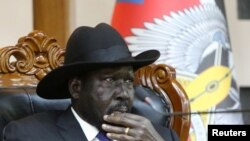The Cabinet of South Sudan's President Salva Kiir has endorsed his decision to return the country to a system of 10 states, with the addition of three administrative areas, ahead of Saturday’s deadline to form a transitional unity government.
Kiir bowed to pressure from opposition parties last weekend and scrapped a 32-state system he established unilaterally during South Sudan's civil war. Kiir and opposition leader Riek Machar are now under international pressure to create a unity government by Saturday, after missing two previous deadlines.
Government spokesperson Michael Makuei said that after Wednesday's meeting, the Council of Ministers directed Justice Minister Paulino Wanawilla to revise language in the August 2018 peace deal to incorporate the 10-state proposal into the transitional constitution.
“After being discussed, it was passed by the Cabinet and [they] directed the minister of justice to prepare it and tabled before the Cabinet, probably this afternoon, so that it is adopted by the Cabinet because there is no room for further extension,” Makuei told VOA's South Sudan in Focus program.
Makuei said President Kiir will likely sign the amended language into law on Friday.
Manawa Peter Gatkuoth, deputy spokesman of the main opposition party SPLM-IO, said the party is not opposed to forming the unity government by the Feb. 22 deadline, but wants to see all provisions of the peace deal, including security arrangements, implemented before then.
“At least 90 percent of the outstanding issues, we handled them like the position of 10 states, which has been taken by the president. We welcomed it, and also we put our observation especially about Ruweng. This issue should be on the table,” Gatkuoth told South Sudan in Focus.
Ruweng is one of three administrative areas proposed by President Kiir. It is also located in the oil-rich northern part of the country, which opposition and government forces fought to control during the country's five-and-a-half year civil war.
Makuei said everything should move forward quickly, noting most security mechanisms are in place.
“There are VIP protection units, they are ready in Gorom and can be graduated even tomorrow or next [the day after] tomorrow and they will be deployed. They will be here in Juba to protect the VIPs. Secondly, the unified forces that are there, some of them are trained,” Makuei told reporters in Juba Wednesday.
Makuei said establishment of the government will not be “held hostage for some provision of the agreement” which has yet to be completed.









